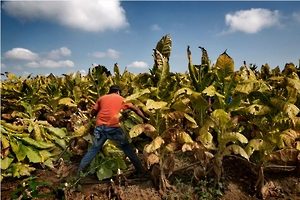US: Tobacco Company Bans Hiring Children Under 16
The decision by the US tobacco company Altria Group to prohibit growers in its supply chain from hiring children under 16 could protect children working on US tobacco farms, Human Rights Watch said today.
Altria Group – parent to three US tobacco companies, including Philip Morris USA, the largest cigarette company in the US – announced on December 11, 2014, that its new child labor standard will take effect beginning in 2015. Prior to this change, Altria Group deferred to US labor law for the minimum age to work, which allows children as young as 12 to work unlimited hours outside of school on a farm of any size, and has no minimum age for children to work on small farms.
“Altria Group has taken an important step toward protecting younger children from the dangers of tobacco farming,” said Margaret Wurth, children’s rights researcher at Human Rights Watch. “The company should continue updating its child labor policy to protect all children from nicotine exposure and other serious health and safety risks.”
Human Rights Watch in a May 2014 report found that child tobacco workers on US farms are exposed to nicotine, toxic pesticides, extreme heat, and other dangers. Most of the children interviewed reported nausea, vomiting, headaches, and dizziness – all symptoms of acute nicotine poisoning.
Altria Group will also require parental consent for children under 18 working in tobacco farming. Both changes to the company’s child labor standards will not cover children working on family farms.
The changes will be contractual requirements for all growers selling tobacco to Altria Group in 2015.
Reynolds American, parent of R.J. Reynolds, the second-largest US tobacco company and one of Altria Group’s main competitors, does not have a child labor policy.
Human Rights Watch has urged 10 of the world’s largest tobacco companies, including Altria Group and Reynolds American, to strengthen their child labor policies to protect all children under 18 from hazardous work on tobacco farms in their global supply chains, including any work involving direct contact with tobacco in any form.



